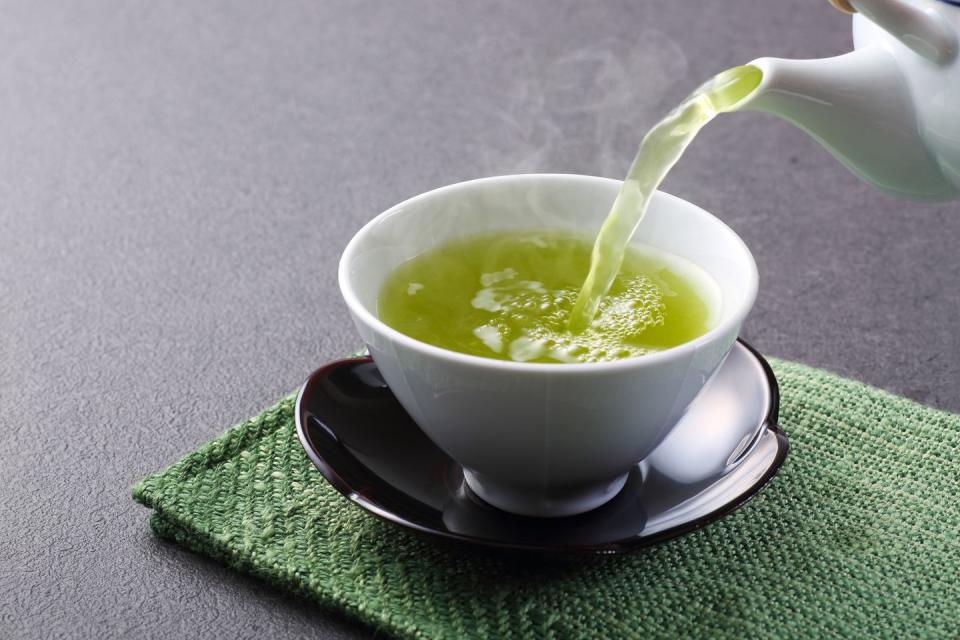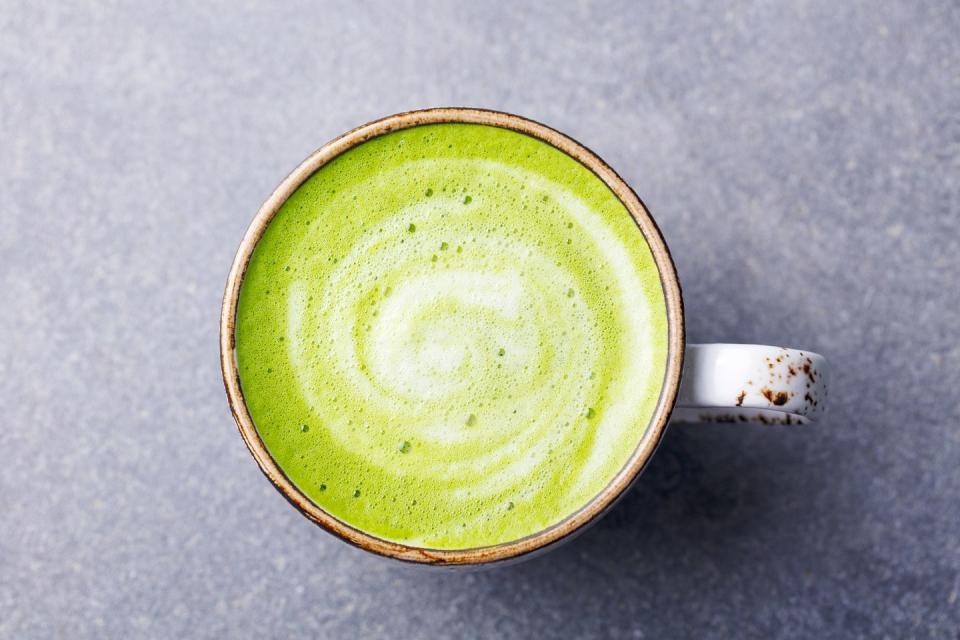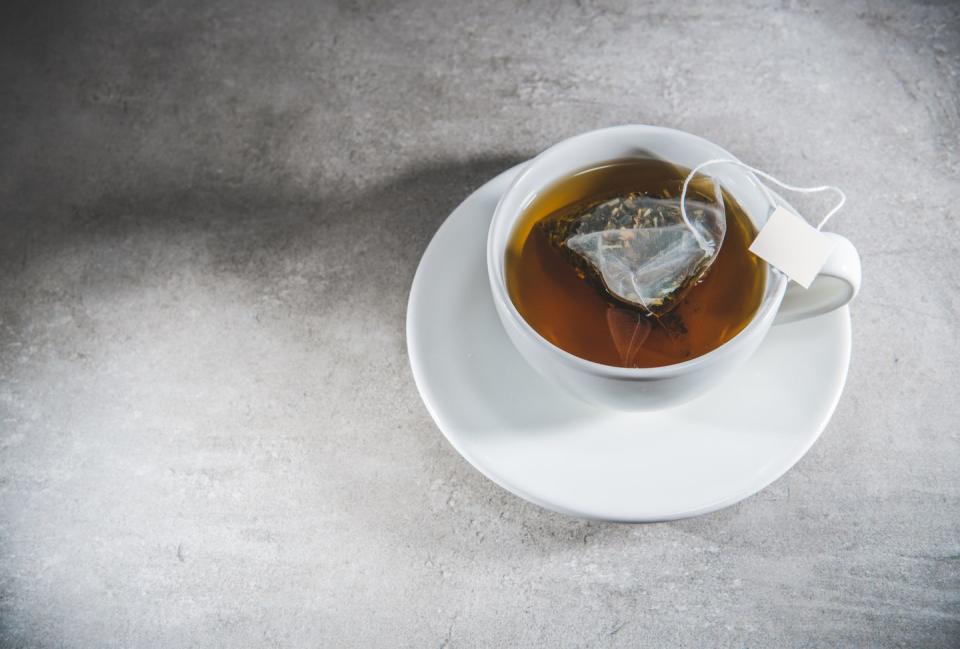These 4 Types of Tea Will Boost Your Hydration, Performance, and Muscle Recovery, So Get to Brewing

"Hearst Magazines and Yahoo may earn commission or revenue on some items through the links below."
From fruit juices spiked with adaptogens to probiotic-filled kombucha, these days there is no shortage of “functional” drinks claiming to have what it takes to keep you in tip-top shape.
But when it comes to staying on top of your hydration needs, tea—the most frequently consumed beverage in the world after water—is a less costly, flavorful, aromatic, and an overall healthful drink to sip throughout the day.
→ No matter what you’re looking to improve in your riding life, find it with Bicycling All Access!
According to an ever-expanding body of research, drinking tea can do your body a whole lot of good. Amy Goodson, M.S., R.D., C.S.S.D., author of The Sports Nutrition Playbook, tells Bicycling that tea has a variety of plant compounds that provide health benefits and are especially helpful to athletes that train a lot who are constantly working to recover better and fight off inflammation.
Here are a few fast facts about tea’s health benefits in general:
Steeping tea for 3 minutes or more can release more beneficial antioxidants into the water.
Tea is healthy, but more so if you drink it at a temperature below 140°F, which lowers the chances of developing esophageal cancer. Drinks that are too hot can damage cells in the throat, upping the cancer risk.
Consuming tea with milk may lead to the milk’s protein casein binding up tea’s antioxidants, making them less useful to us.
For the best flavor and likely more healthful compounds in a mug, steep loose leaf tea instead of teabags.
Don’t expect to replicate the healthy effects of brewed tea with bottled brands—they are typically heavily sweetened. If you want a cold summer drink, try making your own iced tea from brewed tea leaves with just a touch of a sweetener like honey.
Outside the mug, matcha powder can be added to oatmeal, smoothies, baked goods and popsicles.
Herbal teas—such as chamomile or Echinacea—are technically tisanes, or infusions of herbs and spices (so they’re not a true tea). But they can also aid in hydration efforts and may provide other health perks.
So turn on the kettle, as we sorted through the variety of teas to find the ones with steep benefits.
Green Tea

A combination of high-intensity interval training (hello, hill repeats) and green tea supplementation can have positive impacts on cholesterol numbers and VO2 max, research suggests.
Other studies—including this one and this one—show that regular consumption of green tea extract including before a workout can boost VO2 max, your maximal oxygen uptake during exercise, which may help you pull away from the pack.
A potential reason for this: The abundance of catechin polyphenol compounds (a type of antioxidant) in green tea may increase blood flow to muscles and/or improved oxygen removal from the blood—both of which could have a performance-boosting potential.
Another study in the journal Physiology & Behavior suggests that supplementing with green tea extract can reduce the muscle-damaging effects of exercise, which may improve recovery.
“Catechins are natural antioxidants that reduce the formation of free radicals in the body to help lower exercise-induced stress on the body,” Goodson says.
The big caveat here is that almost all the studies conducted on green tea and exercise have used concentrated green tea supplements. So we don’t know how much brewed green tea you’d have to drink to get the same level of compounds to have a beneficial impact. Plus, levels of antioxidants can vary greatly between different brands.
With respects to health measures, science suggests drinking more green tea can help lower the risk for everything from diabetes to stroke to depression to weak bones to heart disease. But we need a lot more data on how much tea needs to be sipped daily to have a noticeable impact, and if certain types of green tea pack more of a punch than others.
Matcha Tea

This verdant powder enjoys a well-deserved health halo. Matcha, made from air-dried and then powdered tea leaves, is like the superhero version of regular green tea, since you are consuming the whole leaves—in doing so, you’re taking in higher amounts of antioxidants, including green tea’s signature compound epigallocatechin gallate (EGCG).
“Research suggests that EGCG is associated with a reduced risk of cancer, high blood pressure, and the accumulation of plaque in blood vessels,” Goodson says.
Taking in more EGCG may also help shield you from coming down with a cold or flu, which is especially helpful during bouts of hard training that can temporarily suppress immunity. Green tea powder has been shown to improve cognitive functioning in older adults, but this brain perk may or may not occur in younger people.
Similar to green tea, a study in the International Journal of Sport Nutrition and Exercise Metabolism suggests drinking matcha could lead to endurance benefits by helping spare your carb stores for when you need them most, namely any hard-charging efforts. But at the moment we don’t have any data to say if a daily matcha latte habit can bring about noticeable improvements in KOM or QOM pursuits.
While matcha does provide some caffeine, it also contains an amino acid called L-theanine, which produces a calming effect and combats anxiety.
Better-quality matcha will have naturally sweet, vegetal tasting notes and a vibrant green hue.
Oolong Tea

Oolong is made when tea leaves are semi-oxidized to varying degrees, and it falls somewhere between green and black tea in color, flavor, and antioxidant levels.
Oolong does seem to have a strong antioxidant capacity, meaning that it can help lessen the cell-damaging impacts of free radicals and, in turn, perhaps offer some protection against certain conditions like breast cancer. And, emerging research has discovered that drinking tea—including oolong—could tilt our microbiome more toward a population of beneficial bacteria, which may lead to better digestive and immune health. Plus, research also shows drinking oolong can improve your cycling power to weight ratio.
Let’s not overlook that drinking any tea—including oolong—can help in your daily hydration efforts. A paper published in the American Journal of Clinical Nutrition notes that clinical studies show that tea is as good a source of hydration as water or a sports drink. A major benefit of drinking brewed tea is that it can replace sugar-sweetened beverages in our diets.
Black Tea

Black tea’s flavor can range from spicy to fruity to flowery, and popular varieties include Earl Grey and Darjeeling.
While black tea is not quite as high in antioxidants as its green counterpart, it may also be a heart helper. Based on the findings in this systematic review, each 8-ounce cup of unsweetened black tea consumed per day lowered the risk of early death from heart disease in people by about 4 percent, compared to non-tea drinkers. One reason why is the power of the brew to improve cholesterol numbers including lowering LDL (bad) cholesterol, while helping raise the number of beneficial HDL cholesterol. And, a study in the journal Nutrients found that drinking 2 cups of black tea daily helped people drop their blood pressure numbers.
You can also jazz up your morning rides or tackle an afternoon slump with black tea, which tends to have a higher caffeine content than green tea.
“However, it is important to note that caffeine intake affects various people in various ways,” Goodson says. “People that are more sensitive to caffeine might benefit from smaller amounts, whereas some people might need higher levels of caffeine to see a performance benefit.”
It can take up to 4 cups of black tea to deliver roughly the same caffeine buzz as a cup of coffee. Still, that could be enough to disrupt sleep, so make black tea an earlier in the day habit.
You Might Also Like

